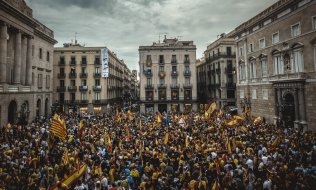Carles Puigdemont is demanding amnesty and an end to proceedings against Catalan
26 Debates

26 Debates
Carles Puigdemont is demanding amnesty and an end to proceedings against Catalan
According to research by The Citizen Lab think tank, the mobile phones of more than 60
Spanish Prime Minister Pedro Sánchez met the President of the Government of Catalonia Pere Aragonès in Barcelona on Wednesday to resume the dialogue on Catalan independence dispute after an 18-month break. However, the only result of the meeting was the announcement that the parties would continue the talks despite their opposing positions. The Junts party, the more radical junior coalition partner of the
Despite strong opposition across the country, the Spanish government has pardoned nine imprisoned Catalan separatist leaders. They will be released on parole on Wednesday after more than three years behind bars and are banned from holding political office. While Spanish commentators are divided over whether this was the right decision, media from other countries approve.
The European Parliament has lifted the immunity of
There are growing signs that a coalition between the Socialists and the left-wing party Podemos will be able to form a government majority with the backing of the Catalan separatist party ERC. However, in exchange for its support ERC is demanding a signal that the government will obey the
Thousands of people in Barcelona protest daily against the Spanish
The trial of twelve Catalan separatists began on Tuesday in Madrid. Spain's public prosecutor wants them to receive sentences of up to 25 years in prison for rebellion, insurgency and misuse of public funds in connection with the 2017
In the negotiations with the Catalan separatists Spain's Socialist Prime Minister Pedro Sánchez has conceded to the demand for an independent facilitator. The right-wing opposition made up of the conservatives (PP), the liberals (Ciudadanos) and the far right (Vox) see Spain's unity at risk and have called a mass demonstration for Sunday to demand new elections. Is Spain's minority government tottering?
The Catalan separatist leader
The public prosecutor's office of the German state of Schleswig-Holstein has concluded that the European arrest warrant for Carles Puigdemont is justified and wants the former Catalan regional president to be extradited to Spain. The Spanish judiciary has accused Puigdemont of rebellion and other crimes. Now the higher regional court must rule on his extradition. Commentators take differing views on the issue.
Prime Minister Mariano Rajoy's minority government wants to have a say in Catalonia's language policy. And because the
The three separatist parties have maintained their majority in the elections in Catalonia. Together they won 70 of the 135 seats in the Catalan parliament. The single biggest winner with 37 seats was the liberal centre-right party Ciudadanos, which strongly opposes secession from Spain, however it lacks coalition partners. Commentators conclude that the vote hasn't solved the problems but has at least brought clarity.
Catalonia's former leader
Hundreds of thousands demonstrated for Spain's unity in Barcelona on Sunday. The central government in Madrid has imposed
The Spanish Senate is expected today to approve measures proposed by the central government in Madrid that will deprive Catalonia of its autonomy and strip its government of its powers. Catalonia's head of government Puigdemont on Thursday rejected new elections and held to his plans for independence. Is a peaceful solution still on the cards?
Catalonian president Carles Puigdemont has postponed the region's secession from Spain. In his speech to the regional parliament he said that the declaration of independence would be postponed to make room for dialogue with Madrid. For some commentators the move is a step in the direction of reconciliation, while for others it is just the opposite.
Hundreds of thousands of Catalonians have demonstrated against police brutality during the
Just days before the independence referendum in Catalonia is scheduled to take place it is unclear whether - and how - the vote can go ahead. Police have been instructed to seal off potential polling stations and thousands of additional officers have been deployed to the region. The regional government is sticking to its plans, however. Commentators have differing views on the separatists' struggle for independence, but all of them hope the situation won't end in violence.
The central government in Spain is upping the pressure on the Catalan separatists. The military police arrested twelve senior officials of the regional government today, Wednesday. Meanwhile a growing number of Catalan politicians are speaking up in defence of the independence referendum slated for 1 October. People in other regions of Spain are demonstrating to show their support. Is all hope of an agreement in vain?
Spain's Constitutional Court has put a stop to the plans to hold an independence referendum in the autonomous community of Catalonia. Just a day before the parliamentarians in Catalonia's regional parliament had passed a law that was to pave the way for a referendum on October 1. Could it be that the separatists' goal is right but their strategy wrong?